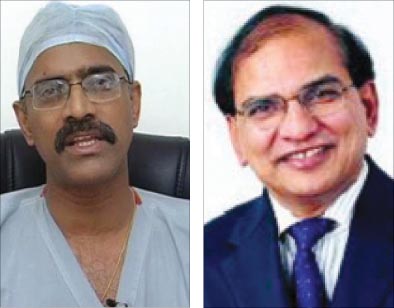
Dr. A. G. K. Gokhale and Dr. K. Ravindranath
Bypass surgery in India is cheaper by Rs. 100,000 when compared with costs in Sri Lanka, an Indian doctor told The Sunday Leader. Dr. A.G.K. Gokhale, Senior Consultant and Head, Cardiothoracic & Vascular Surgery, Global Hospitals, Hyderabad, speaking to this reporter in Colombo recently said that while bypass surgery in India would cost the equivalent of Rs. 350,000; in Sri Lanka it would cost Rs. 450,000.
Asked whether the proposed Comprehensive Economic Partnership Agreement (CEPA) with India which intends to liberalise the movement of natural persons or professionals between the two countries would result, as far as the medical profession is concerned, a cost reduction to the Sri Lankan consumer, he said that not as far as the treatment of cardiovascular (heart) disease was concerned, where costs were going up, even in India.
He however said that he was not qualified to speak in regard to costs vis-a-vis other areas of medi-care.
“One of the biggest obstacles in lowering costs is the need to import expensive medical equipment for the treatment of such diseases,” said Gokhale. “If such equipment could be indigenously made, then costs would go down,” he said.
On the question of the quality of Indian physicians, an issue raised by the local medical fraternity in the event CEPA came on board? Gokhale’s said that that barrier could be circumvented by checking the antecedents of such doctors, such as the number of patients they have had treated, before allowing them into the island carte blanche.
“For instance if 10 cardiologists apply to join Global Hospitals there is no guarantee that all of them would secure employment there,” he said.In regard to the possibility of knowledge and technological transfer in the event CEPA comes on board? He said that that would be a natural outcome of CEPA.
Gokhale further said that though Sri Lanka’s medi-care has made strides in regard to the treatment of cardiovascular disease, there were other areas in that sphere that Sri Lanka lagged behind. “For instance Sri Lanka lacks the experience of performing minimal invasive bypass surgery (a fact confirmed by Sri Lanka National Hospital’s Senior Consultant Cardiologist Dr. P.N. Thenabadu),” said Gokhale. Minimal invasive bypass surgery (MIBS) avoids traditional bypass surgery, where, in the case of the latter, it leads to bad scarring, loss of a lot of blood and a period of convalescence which may take upto two months.
“But MIBS results in less scarring and bleeding and a convalescence period which may be as short as three weeks,” he said. Another area that Sri Lanka lacks experience is in the sphere of heart transplantation, added Gokhale.
Global Hospitals Group, India Chairman Dr. K. Ravindranath said that his hospital, which is a US$ 100 million turnover hospital will go pan India by 2012, by which time it will double its turnover to US$ 200 million.
“After which we may consider expanding overseas, in places such as Sri Lanka, South Africa, the Middle-East and the UK,” he said.
“But if we expand overseas, we will make sure that we will have the controlling interest,” said Ravindranath, referring to the “fiasco” of Apollo Hospitals India’s investments in Sri Lanka, which was subjected to a successful hostile takeover bid, after which it came under state control, consequent to a court decision which reversed the privatization of the Sri Lanka Insurance Corporation, which has a controlling stake in Apollo.
It was said at a seminar organized by Global Hospitals in Colombo recently, that India’s poor, which comprises 60% of its population, enjoys state insured medi-care. “As a result, cardio vascular surgery on that segment of the population is conducted at a cost of Indian Rs. 100,000 which is just enough to cover expenses,” said Ravindranath. “But because of economies of scale (India has a population of 1.2 billion), that arrangement is profitable,” he added.
“India, because of its large market, has honed in competent surgeons due to the sheer experience they have had gained by treating to a larger number of patients relative to other countries, with the possible exception of China,” said Ravindranath.
But India’s competitive advantage over China is the knowledge of the English language, in which discipline China lags behind, he said.
Speaking to an audience, which largely comprised representatives from the local medical profession, he said, “In the years gone by, when I was serving in a hospital in England, those well to do from the SAARC region use to come to the UK for liver transplants, because that treatment was not available locally,” Ravindranath, a gastroenterologist by profession said.
They had to pay an advance of GBP 70,000 to be on the waiting list.
But the arrangement in the UK then was that first preference should be given to Britishers, then to Europeans and the last to patients from other areas such as those from the SAARC region. “As a result of the long waiting, a number of patients from this part of the world succumbed to their disease before coming under the surgeon’s knife,” he said. But the operations were conducted by Chinese and Indian doctors.
But now such organ transplants are conducted by Global at a fifth of the cost that the patient would have had to pay in the event he sought treatment from countries such as UK and Singapore, said Ravindranath.
 Ask Doctor
Ask Doctor